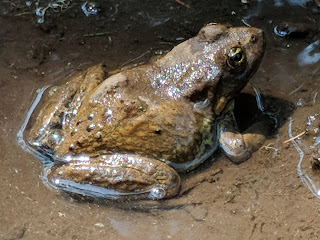Why Pesticides are Approved by the FDA and Why They Should be Avoided
In the previous blog post we learned about pesticides, toxicity, and how pesticides could affect your health. In this article we will discuss the real dangers to pesticides and why they should be avoided.
Why Pesticides are Used
Pesticides are toxic. They kill certain organisms that are exposed to them, but they have a low impact on humans and other mammals. This is good because we are able to protect our food from pests without significantly influencing our health in a negative way. So why should we avoid pesticides?
Why Pesticides Should be Avoided
Let's use insects in this next example. I know people who wonder why insects even exist. They think the world would be better off without them. The truth is, birds, fish and reptiles would not exist without insects because that is what they eat!
Remember that toxicity is measured by the lethal dose of 50% of a target population? Well, what about a non-targeted population that exists in the same area as the target population? Pesticides have a low toxicity to humans and mammals, but they are extremely toxic to birds, fish, and reptiles, the very organisms that prey on the insects we are killing with insecticides!
 |
| Frogs Eat Bugs not Fruit |
Since this is a blog about fruit tree health and pruning, let's talk about insect's roll in fruit production. There is a lot of talk about honey bees and their decline, so we won't go into detail about that, but honey bees, wasps, ants, butterflies, and beetles are all important pollinators that aid in a plant's ability to produce fruit.
 |
| Honey Bees are the Most Popular Pollinators |
Insects are an important part of a complex ecosystem that you and I are part of.
Well, what about fungal disease? Not all fungus is bad for fruit trees. Plants coexist with soil bound fungi called Mycorrhizae that grows on root tips and aids in the mineral and nutrient intake. If we kill that fungus, we are weakening our trees and making them more suceptible to other pest infestations.
 |
| Mycorrhizae Fungi Grows on Root Tips |
The purpose of these two blog posts is to explain that pesticides may or may not significantly impact the health of humans, which is why they are approved by the Food and Drug Administration (FDA) and the Environmental Protection Agency (EPA) for use on fruit and vegetable crops, but they are significantly impacting the environment we live in. The truth is, pesticides are ngatively affecting birds, reptiles, fish, and beneficial insects, all of which are important organisms for the earth that we live in.
How Do We Protect Our Food From Pests?
Talking about a problem without proposing a solution is not constructive, so how do we protect our food from pests?
Plants have evolved alongside the organisms that we consider pests. They are naturally able to defend themselves from these pests, but only if they themselves are healthy. If you plant a fruit tree in your yard that is zoned for your environment and it receives plenty of sun light, water, and nutrition from the soil, then you will find that your fruit trees in impacted by pests less than a tree that is lacking the elements that it nees to thrive.
 |
| Healthy Trees are Less Susceptible to Pests |
Apples can be protected from codeling moth with a small paper or fabric bag that keeps them from boring into the fruit. This is an example of a mechanical devicce that can protect your fruit from insects.
For more information about the care and pruning of fruit trees, please subscribe here:
Caterpillars will munch on the leaves of some plants. There is a bacteria called Bacillus thuringiensis (Bt) that can be applied to fruit and vegetable crops that will make caterpillars sick and die. This should be used with caution because many butterflies are beneficial pollinators. Monarchs caterpillars for example only feed on a milk weeds plants and will die if they consume Bt. Lady bugs, praying mantis, and other beneficial insects will prey on unwanted insects.These are all examples of biological controls.
Diatomaceous Eath (DE) is a natural type of clay that can aid in your pest control efforts.
As you can see, there are cultrual, mechanical, biological, and mineral ways of protecting your fruit trees from pests that don't have the same negative effects on your health or the health of the envionment that we live in.
Conclusion
There are real dangers in using pesticides on your fruit and vegetable crops. They might not be what you expected, but they do have an effect on the environment and should be avoided.
Thanks for Reading! If you would like to learn more about the care and pruning of fruit trees, please browse our 100+ fruit tree articles here, join our Backyard Fruit Growers Facebook Group, and take our free Fruit Tree Pruning Course. Also, please subscribe to our Fruit Pruning YouTube Channel.



Comments
Post a Comment